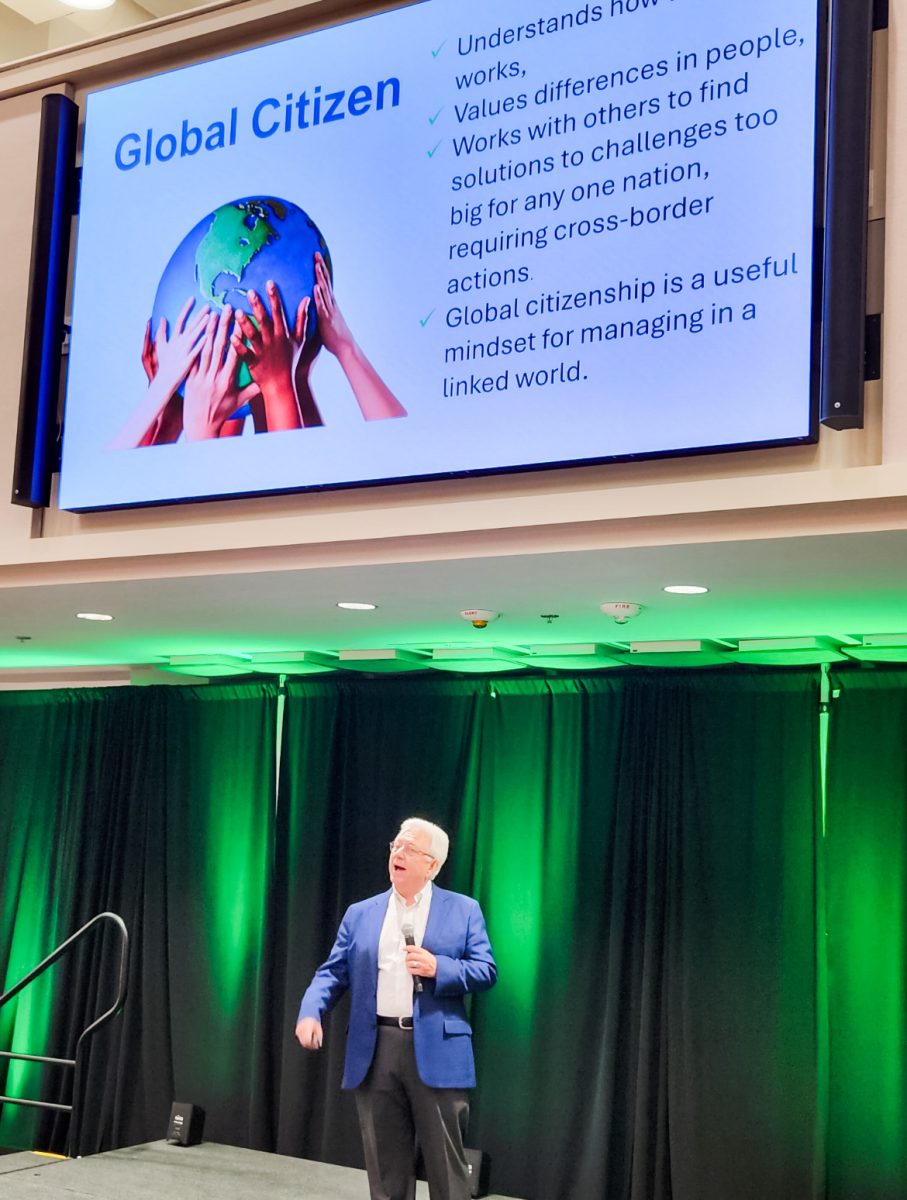The University of North Dakota’s Department of Languages and Global Studies recently launched the Global State of Affairs series, a new initiative to foster global awareness and cultural competency among students and the community. The first event, held Tuesday, October 29, from 5 to 6 p.m., featured a keynote address by Delore Zimmerman, founder of Praxis Strategy Group and an advocate for global development and international collaboration.
Organized by Dr. Amanda Nagy, associate professor of German studies and director of UND’s Global Studies program, the initiative developed in collaboration with scholarship adviser Dr. Yan Chu.
“Global studies is a 21st-century major or minor,” Nagy said. “In our increasingly interconnected world, it’s essential for students to understand cultural perspectives and global issues.”
The program emphasizes global competency, equipping students with skills for international careers by broadening their cultural understanding.
Zimmerman shared his journey as UND sociology student to his work in international development, drawing on decades of experience in global advocacy. He encouraged students to consider how their lives and careers could contribute to a more connected and compassionate global society.
His consulting firm, Praxis Strategy Group, has led local and international initiatives since its founding in 1994. Through projects like Praxis Africa, a division focused on development in African nations, Praxis supports agricultural development, sanitation, and youth empowerment initiatives. In Ghana, Zimmerman was honored with the title “Porcupine Warrior,” recognizing his contributions to community projects, including an information and communications technology center, early childhood education, and agricultural training.
In his talk, Zimmerman offered practical advice for students interested in making a global impact.
“To start, build a general awareness of the world and maybe focus it on some geographies that they have an interest in for some reason,” he said. Zimmerman also advised students to approach international work with resilience and adaptability, noting that “you have to understand there’s going to be uncertainties.”
To help build cultural competency, Zimmerman encouraged students to read widely and explore international perspectives through sources like The Economist, BBC World News, and Al Jazeera. He acknowledged that while media sources may have biases, they are essential tools for understanding different perspectives on global events.
In an interview, Zimmerman went deeper into specific issues he feels are critical for those interested in international work, especially in regions like Africa, such as food security and sustainable agriculture.
“The whole area of clean tech, you know, water technology, waste technology… food for people, food for animals, food for fish,” could help with the region’s fast-growing populations, he said. Additionally, Zimmerman emphasized the increasing role of renewable energy, saying that “the future of global power may hinge on innovations in nuclear and other renewables.”
As a strong advocate for humanities, Zimmerman underscored the importance of a university education in developing well-rounded, globally aware citizens. Reflecting on his background in history and literature, he shared how these fields have enhanced his adaptability and critical thinking. They provided him with a system-level approach and helped him find useful links between various fields in his career.
Zimmerman also stressed the importance of long-term planning in global work, particularly in areas like sustainable energy and technological infrastructure. He advised students to stay informed on energy and technology trends, noting that these fields are integral to solving modern global issues. He believes that today’s global challenges require forward-thinking solutions and urges students and professionals to consider long-term impacts in their work.
As UND’s Global State of Affairs series expands, Zimmerman’s message of being a global citizen resonates with the program’s goals. Nagy shared that future events will focus on various regions and themes, with interactive workshops on cultural awareness, ethical global leadership, and civic engagement. The program will be held in the renovated Merrifield Hall next spring, where a “Café of Active Language Learning” will allow students to explore global cuisines, music, and intellectual exchange.
The Global State of Affairs series aims to give students hands-on opportunities to engage with diverse perspectives.
“There’s no better way to prepare students for global challenges than by exposing them to different cultures and viewpoints,” Nagy said.
With guidance from leaders like Zimmerman, the Global State of Affairs series has launched with a powerful message on being a global citizen. For Zimmerman, “citizen diplomacy,” the idea that building goodwill through human connections is at the heart of international work, is a guiding principle.
“People will remember the way you treat them more than anything else,” he said, echoing Maya Angelou’s words, “people will forget what you said, people will forget what you did, but they’ll always remember how you made them feel.” Zimmerman explained that this human-centered approach transcends language barriers and fosters lasting relationships, essential for a more connected world.
For updates on upcoming events in the series, visit UND’s Languages and Global Studies office at 276 Centennial Dr., Stop 8198.
Davíd Moreno is a Dakota Student General Reporter. He can be reached at davíd.moreno@und.edu.



